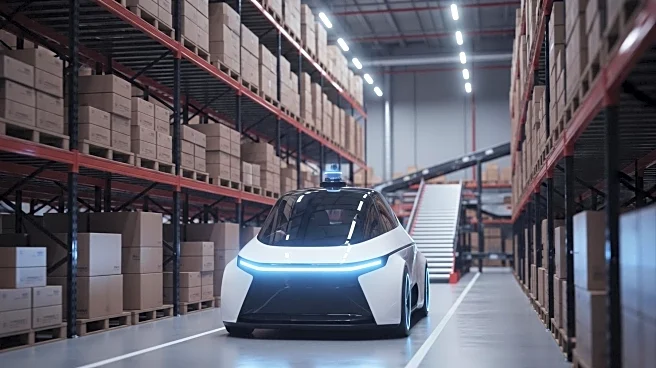What's Happening?
Venti Technologies, a company with origins at MIT, is deploying autonomous vehicles to improve operations in ports, warehouses, and the global supply chain. These vehicles are designed to enhance efficiency and reduce costs in logistics operations. The deployment of autonomous technology represents a significant advancement in supply chain management, offering potential solutions to challenges such as labor shortages and fluctuating demand. Venti Technologies' initiative reflects a growing trend towards automation in logistics, aiming to streamline processes and improve throughput.
Why It's Important?
The introduction of autonomous vehicles in the supply chain has the potential to revolutionize logistics operations. By automating tasks traditionally performed by human workers, companies can reduce labor costs and increase efficiency. This technology also offers solutions to address labor shortages, a critical issue in the logistics industry. The deployment of autonomous vehicles can lead to faster and more reliable operations, enhancing competitiveness and customer satisfaction. As the logistics sector continues to evolve, automation will play a crucial role in shaping its future.
What's Next?
As Venti Technologies expands its deployment of autonomous vehicles, other companies in the logistics industry may follow suit, accelerating the adoption of automation. Regulatory frameworks will need to evolve to accommodate the use of autonomous technology, ensuring safety and compliance. The success of this initiative could lead to further investments in automation and AI, driving innovation and efficiency in supply chain management. Stakeholders will closely monitor the impact of autonomous vehicles on operational performance and workforce dynamics.
Beyond the Headlines
The deployment of autonomous vehicles raises important ethical and legal considerations, particularly regarding safety and liability. As automation becomes more prevalent, companies will need to address concerns about job displacement and workforce retraining. The integration of autonomous technology also highlights the need for robust cybersecurity measures to protect against potential threats. Long-term, the shift towards automation could lead to significant changes in supply chain strategies and global trade patterns.












